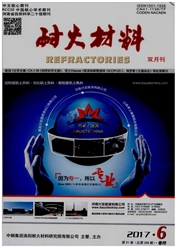

 中文摘要:
中文摘要:
为了提高酚醛树脂的残炭率并优化热解炭的结构和性能,将Ni(NO3)2·6H2O按1:100的质量比掺入热固性酚醛树脂中制备Ni掺杂酚醛树脂,经200℃固化后,分别在不同气氛(埋炭和Ar气氛)和不同温度(600、800、1000和l200℃)下保温3h炭化,然后检测其残炭率,并借助差示扫描量热仪、X射线衍射仪、能谱仪、扫描电镜、透射电镜表征其热分解特征及其热解发的抗氧化性、物柏组成和显微结构。结果表明:1)Ni掺杂酚醛树脂在800和1000℃的残炭率均比未掺杂酚醛树脂的提高较多;2)随炭化温度的升高,M掺杂酚醛树脂热解发逐渐向石墨化碳结构方向演化;3)Ni掺杂酚醛树脂经1000℃炭化形成的热解炭中有大量直径50~100nm、长度可达几十微米的多壁碳纳米管;4)在血气氛中炭化更有利于碳纳米管的生成,并且热解发具有更高的残炭率和结晶度;5)1200℃炭化形成的热解炭的抗氧化性显著提高,氧化峰值温度比未掺杂酚醛树脂的提高约84℃。
 英文摘要:
英文摘要:
Ni-doped phenol resin was prepared with 1:100 mass ratio of Ni( NO3)2 · 6H20 to thermosetting phenol resin to optimize the structure and properties of pyrolytic carbon derived from phenol resin and in- crease its carbon yield. The specimens were cured at 200 ℃ and coked under different atmospheres (car- bon-embedded atmosphere and Ar atmosphere) and at different temperatures (600,800,1 000 and 1 200 ℃) for 3 h, respectively. The carbon yield was measured. Thermal decomposition characteristics of Ni- doped phenol resin, and the oxidation resistance, phase composition and microstructure of pyrolytic carbon were characterized by differential scanning calorimetry,X-ray diffraction, energy dispersive spectroscopy, scanning electron microscopy and transmission electron microscopy. The results show that the carbon yield of Ni-doped phenol resin coked at 800 or 1 000 ℃ is increased significantly, compared with that without any dopants. The graphitization degree of pyrolytic carbon structure derived from Ni-doped phenol resin increa- ses with the increase of carbonization temperature. The massive multi-wall carbon nanotubes of 50 - 100 nm in diameter and of micrometre scale in length are generated at 1 000 ℃. Compared with the carbon-em- bedded atmosphere,carbon nanotubes can be more easily generated under Ar atmosphere, resulting in higher carbon yield and degree of crystallinity of the pyrolytic carbon derived from Ni-doped phenol resin. The oxidation resistance of the pyrolytic carbon derived from Ni-doped phenol resin at 1 200 ℃ is improved significantly and its highest oxidation temperature is increased by about 84 ℃,compared with that from Ni free phenol resin.
 同期刊论文项目
同期刊论文项目
 同项目期刊论文
同项目期刊论文
 Modeling of the Relationship between Pore Size Distribution and Thermal Conductivity of Corundum Bas
Modeling of the Relationship between Pore Size Distribution and Thermal Conductivity of Corundum Bas Matrix structure evolution and thermo-mechanical properties of carbon fiber-reinforced Al2O3-SiC-C c
Matrix structure evolution and thermo-mechanical properties of carbon fiber-reinforced Al2O3-SiC-C c In-situ Formation of MgO Whiskers and CNTs and Their Influence on the Mechanical Properties of Low-c
In-situ Formation of MgO Whiskers and CNTs and Their Influence on the Mechanical Properties of Low-c Microstructure and mechanical properties of low-carbon MgO-C refractories bonded by an Fe nanosheet-
Microstructure and mechanical properties of low-carbon MgO-C refractories bonded by an Fe nanosheet- 期刊信息
期刊信息
